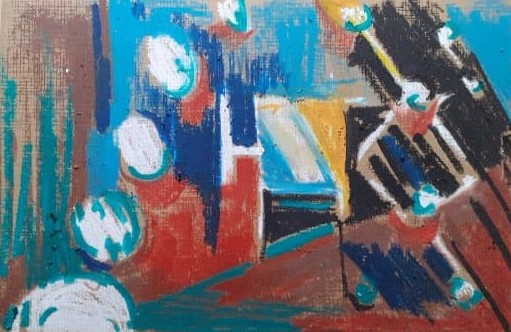How am I even supposed to start writing about violence? The topic seems so close, yet so distant. Am I the right person to rock the boat? Where should the story begin? In childhood, in friendships, international affairs, private stories, or secrets whispered at night to those with whom we are bound by a vow into a secret understanding of what it, violence, is.

M. Cendrowska
When I was eighteen, I went to Oxford to work on my English. The course lasted three weeks, and there were people from countries across the globe. This is how I, a Pole, came across two Russians—let’s call them Dima and Sveta, and a Ukrainian—call him Vitaly.
We spent six hours in class studying and then, in the evening, another few in haphazard gaggles, hanging out in pubs to learn the real language helped by a real Harp flowing through our veins. “Let’s piss all those pints up the wall!” and off we went. My favorite challenge was going back on a bike, murmuring about why they drive on the wrong side. When it was time for me to catch the bus for the airport, ‘cos my adventure had at last come to an end, I spent my last twenty pounds on one last pub crawl and got on the bus as penniless as a lone eighteen-year-old can be on their first trip abroad.
But let’s stay in Oxford for a while longer. The medley of players was perfectly matched. However, beasts were lurking in the shadows ready to strike.
My gang was special. Sveta was twenty-two and had come with her mother. Unfortunately, her mum remained a stranger to the rest of us. She was too scared to go outside, stayed at the hotel, and even brought a true Russian samovar to make herself some proper chai in the land of English Breakfast. The world she had been forced to visit didn’t seem to please her. As for the rest, Dima and Vitaly made friends. The four of us had our own “Slavic table,” as we liked to call it. The languages spoken at the table were English, as well as Polish, Russian, and Ukrainian.
One day we were going about how wonderful, refreshing, comforting, and liberating it was to talk among Slavs, and I both revelled in and relished how kind we are as a people. Dima frowned. He hesitated for a while and then said:
“Yes, but I’d say we have close bonds with Ukraine—much closer. It’s almost as if the boundaries were invisible. Well, it’s just not the same with Poland, you know…”
That was back when Russian culture fascinated me, and I was dying to see Baikal, not to mention the fact that I converted to the Polish Orthodox Church. I suddenly felt severed from “my” Slavic table and said something bitter; I can’t even remember what it was. I felt hurt and offended that my that brother and sister Slavs didn’t regard me as one of them.
Today I know that there is a fine line between liking and possessing, identifying somebody as kin and flattening their identity to the point of invalidity.
Our Ukraine—almost like us: almost us. They hugged. Both were around twenty at the time, so now they are thirty-something. Haven’t heard from them since then.